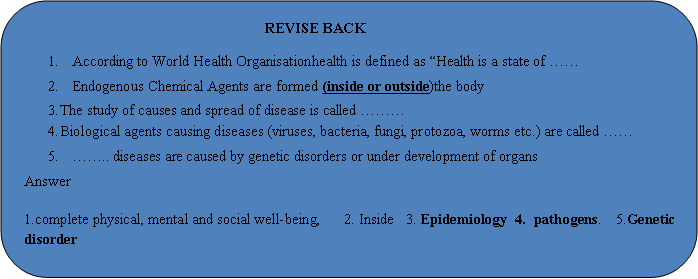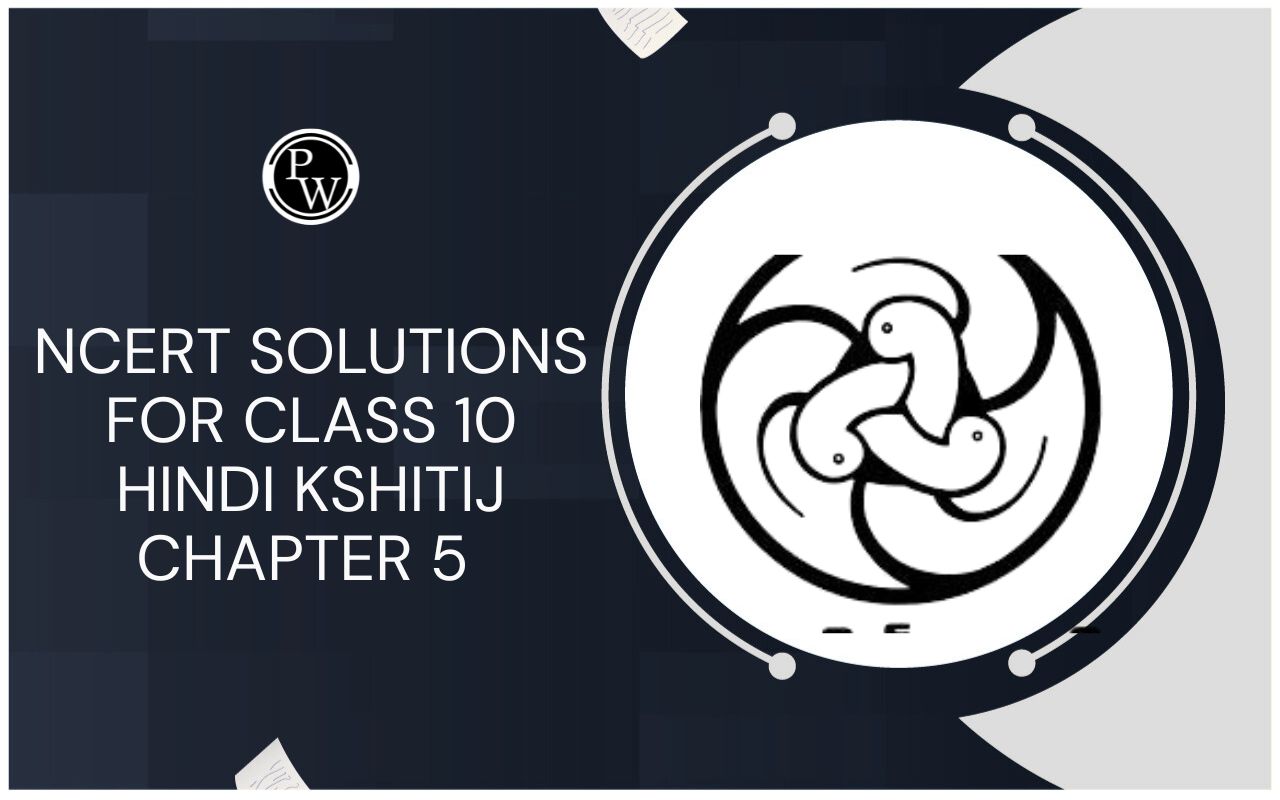
WHAT IS A DISEASE?
Why do we fall ill of Class 9
WHAT IS A DISEASE?
The term diseases ( des-away, aise-ease ) refers to derangement of health or any bodily disorder, or abnormality which does not let the body function properly.
Health is never static, it is dynamic and fluctuating. Any physical or functional change from the normal state that causes discomfort, or disability, or impairs the health of a living organism may also called disease.
Disease can be caused by intrinsic factors i.e. factors within the body and extrinsic factors i.e. factors outside the body. Diseases affect our health by disease-causing organisms, malfunctioning of the vital body organs, and deficiency of nutrients or psychological reasons.
Substances which cause diseases are called agents . Biological agents causing diseases (viruses, bacteria, fungi, protozoa, worms etc.) are called pathogens .
Time interval between the entry of pathogen and appearance of symptoms is called incubation period .
The study of causes and spread of disease is called Epidemiology . Study of the cause of disease is called Etiology .
(a) Distinction Between Healthy and Disease Free:
|
Healthy |
Disease Free |
|
1. It is the state of physical, mental and social well being |
1. It is the state of absence of any body discomfort. |
|
2. It depends upon the person and one’s environment including society. |
2. It depends upon the person alone. |
|
3. A person can be unhealthy even in the absence of disease. |
3. A person would be disease free in the absence of discomfort. |
Disease Causing Agents
Agent is the organism or force or substance whose presence or lack or excess causes disease hence classified as:
- Biological agent: Viruses, bacteria, fungi, protozoan, helminthes, insects etc. These are also called Pathogens (Gr. pathos means disease; genesis means producing). These are those microorganisms which when successfully infect the human body, multiply and produce toxins in incubation period which interfere with the normal functioning of the body and cause a disease.
- Nutrient agents: These comprise food component like high or low levels of minerals, proteins, carbohydrates, lipids, vitamins and water results into disease
- Chemical agent: They are divided into two types:
- Endogenous Chemical Agents:These are formed in the body itself and include hormones enzyme and uric acid. Fluctuation in the level of these components causes disease.
- Exogenous Chemical Agents:These enter the body from outside by inhalation, ingestion or inoculation. Pollutants (fumes, gases, dusts, metals) and allergens (spores, pollen) are examples.
- Mechanical agent: These comprise chronic friction or other mechanical forces which result in injury, sprain, dislocation, and fracture.
- Physical agent: Light, heat, electricity, radiation, sound etc. are also the vital cause of diseases these days.
- Genetic disorder: Some diseases are caused by genetic disorders or under development of organs.

(c) Acute and Chronic Diseases :
The manifestations of diseases are different depending upon a number of factors. one of the factor is duration of disease. on the basis of duration serious disease can be acute or chronic.
Acute disease : actual disease is the one which has a short duration by relatively severe course. most people with acute illness can expect to return to normal health. a case of cough and common cold is an example of an acute illness which lasts only for a few days. afterwards the patient becomes well without any bad effect, loss of weight, feeling of tiredness or short of breath.
Chronic disease : chronic disease is the one which is long lasting is usually slow to develop, often having a major effect on health, reducing the person’s ability to do work efficiently, learning in school or doing work. the patient will also weight and feel tired all the time. examples of chronic diseases include tuberculosis, diabetes, asthma, hypertension, kidney disease, depression, etc. in these diseases we can develop a treatment plan to manage symptoms and prevent complications with the help of doctor.
|
Difference’s Between Acute and Chronic Diseases |
|
|
Acute Diseases |
Chronic Diseases |
|
1. They are short duration diseases of relatively severe course. |
1. They are long lasting diseases of debiliting(Weakening) effect. |
|
2. The patient recovers completely after the cure. |
2. The patient does not recover completely. |
|
3. There is no loss of weight or feeling of tiredness. |
3. There is often loss of weight or feeling of tiredness. |
|
4. There is short duration loss of work and efficiency. |
4. There is prolonged loss of work & efficiency. |
Causes of Diseases :
The various causes of diseases are
- Pathogens : They are disease causing organism like bacteria, viruses, fungi, protozoans, worms, etc. The pathogens are transferred to human being through air, contaminated food, water, soil and animals. Pathogens are primary cause of infectious diseases. However, every body does not suffer equally from infectious agents. There are some contributory causes that increase the proneness of an individual to catch the disease.
- Lack of nutrition diet: it is a second level cause of disease as absence of nutritious diet makes a person unhealthy. Unhealthy persons are susceptible to various diseases in comparison to healthier persons. Another contributory cause can be poor heredity which increases proneness of individual to a particular disease.
- Lack of public services: Government should provide clean drinking water, good sewage disposal, proper garbage disposal, etc. If the public services are poor, there are more chances of contamination of food and water. They are the third level cause of disease. Poor people, due to poverty, live in unclean surroundings where even basic amenities are lacking, there are three level causes of diseases. These are infection with pathogen (1st level), lack of nutrition diet and poor heredity (2nd level) and lack of public services (3rd level).






